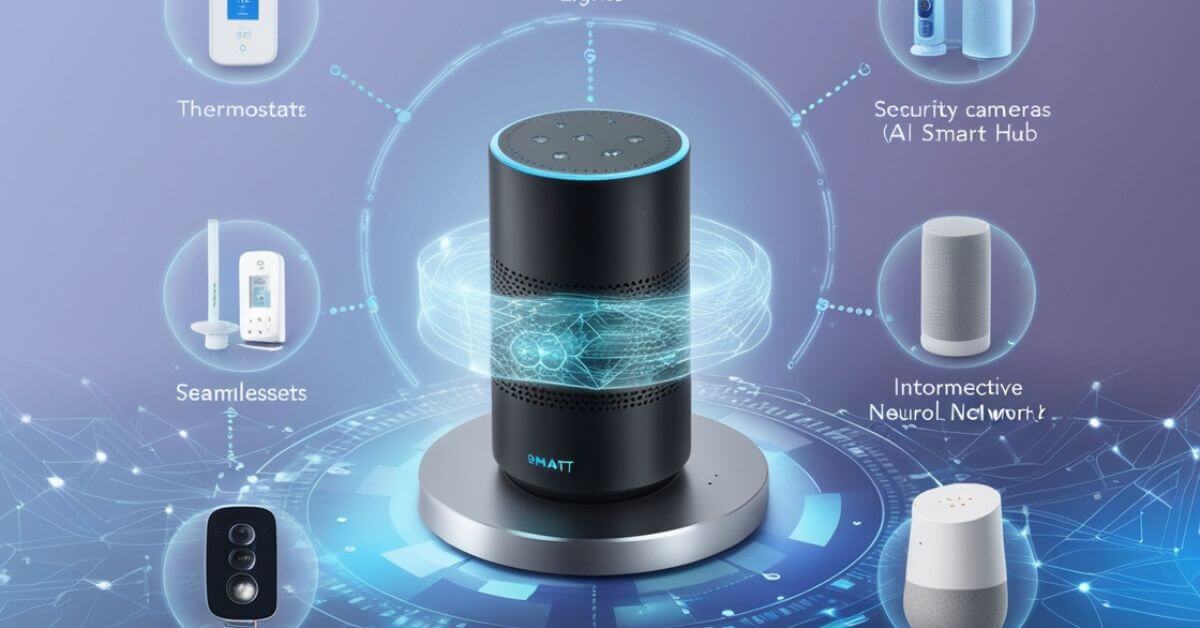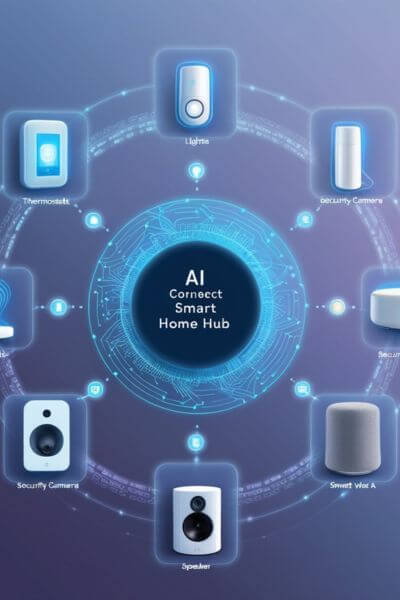SMART HOME HUB
|
SMART HOME HUB (pillar blog) Related Blog |
|
1.Best Smart Home Hubs 2025 |
|
2.Best Smart Home Hubs Alexa |
|
3.Best Smart Home Hubs for Google Home Users |
|
4.Best Smart Home Hub Homekit |
|
5.Best Multi-device Smart Home Hubs |
|
6.Best Understanding Zigbee Zwave |
|
7.Best Budget Smart Home Hubs for 2025 |
|
8.10 Smart Home Automation Ideas for Every Home |
|
9.AI-Powered Smart Home Hubs 10.Smart Home Hubs: Common Issues, Solutions, and Optimization Tips |
The Future of Living: AI Smart Home Hubs
Introduction: Transforming Homes with AI Smart Home Hubs
Imagine a home where your lights adjust to your mood, your thermostat optimizes energy use based on your schedule, and your security system monitors your property in real-time—all seamlessly managed by a single device. This is the reality made possible by AI smart home hubs. As artificial intelligence continues to reshape our world, smart home hubs are at the forefront, offering homeowners convenience, efficiency, and security like never before.
Whether you’re a tech enthusiast or someone exploring smarter living options, understanding how AI-powered smart home hubs work and their potential impact can redefine how you experience daily life.
What Is an AI Smart Home Hub?
An AI smart home hub is a central device that connects and manages all your smart home gadgets, from lights and thermostats to security cameras and voice assistants. Unlike traditional hubs, AI-powered hubs leverage advanced machine learning and automation to adapt to your habits, predict your needs, and provide personalized control over your smart home ecosystem.
For example, an AI-enabled hub can learn your daily routine—automatically dimming the lights at bedtime, preheating the oven when you’re ready to cook, or alerting you to unusual activity outside your home. With voice commands or an intuitive app, you can manage your devices effortlessly.
Core Features of AI Smart Home Hubs
1. Centralized Control
AI smart home hubs unify all connected devices into a single, user-friendly interface. This eliminates the need to juggle multiple apps or remote controls, allowing you to manage everything from your smartphone or a voice assistant.
2. Machine Learning and Adaptation
Unlike traditional hubs, AI hubs learn from your behavior. For instance, if you adjust the thermostat every morning, the hub will automate this action over time, ensuring comfort without manual effort.
3. Voice Assistant Integration
Most AI hubs integrate with popular voice assistants like Alexa, Google Assistant, or Siri. This enables hands-free control, such as asking your hub to turn off lights or play your favorite playlist.
4. Enhanced Security Features
AI hubs monitor your home for potential threats, using smart cameras and sensors to detect suspicious activities. Some hubs send real-time alerts or even contact emergency services if needed.
5. Energy Efficiency
With real-time data and predictive analytics, AI smart home hubs optimize energy consumption, reducing utility bills while minimizing environmental impact. For example, they can automatically turn off devices when not in use.
Real-Life Examples of AI Smart Home Hubs in Action
- Morning Routine Automation:
Imagine waking up to an AI hub that opens your curtains, brews coffee, and reads out the morning news—all synchronized with your alarm clock. - Enhanced Home Security:
An AI hub linked to smart cameras can identify faces and differentiate between family members and strangers, reducing false alarms and improving safety. - Energy Optimization:
During a hot summer, your hub learns your cooling preferences and ensures the air conditioner operates only when needed, saving energy without compromising comfort. - Hands-Free Cooking Assistance:
With voice integration, your hub can pull up recipes, set timers, and adjust your smart oven’s temperature while you focus on preparing your meal.
Benefits of AI Smart Home Hubs
Convenience:
AI hubs eliminate repetitive tasks, allowing you to focus on what matters most.
Personalization:
Their ability to learn and adapt ensures a tailored experience for each household.
Savings:
Energy-efficient automation can lead to significant cost savings over time.
Peace of Mind:
Advanced security features provide homeowners with a sense of safety and control.
How to Choose the Right AI Smart Home Hub
1. Compatibility:
Ensure the hub supports all your existing smart devices.
2. Features:
Look for hubs with machine learning, voice control, and robust security options.
3. Ease of Use:
Opt for a user-friendly interface and seamless app integration.
4. Brand Reputation:
Stick to trusted brands like Google Nest, Amazon Alexa, or Apple HomeKit for reliability.
Potential Challenges and Considerations
- Privacy Concerns: AI hubs collect and analyze data to function effectively, which raises concerns about data security and privacy. Always review the hub’s privacy policies.
- Upfront Costs: High-end AI hubs can be expensive initially, but they often pay off through energy savings and added convenience.
- Learning Curve: While many hubs are user-friendly, some require time to set up and fully customize.
The Future of AI Smart Home Hubs
As artificial intelligence evolves, smart home hubs are becoming even more intuitive and interconnected. Emerging trends include hubs with multi-language support, augmented reality interfaces, and deeper integration with IoT devices. In the near future, we can expect these hubs to proactively anticipate our needs, creating truly intelligent homes that make life simpler, safer, and more enjoyable.
Conclusion: Smarter Living Starts Here
AI smart home hubs are no longer just tech gadgets—they’re transforming how we live. From enhancing convenience and security to saving energy, these hubs are the ultimate gateway to smarter living. Whether you’re just starting your smart home journey or looking to upgrade your existing setup, investing in an AI-powered hub can revolutionize your lifestyle.
So, are you ready to embrace the future of smart living? Explore the possibilities, compare your options, and take the first step toward an AI-driven home to
Top 10 FAQs About AI Smart Home Hubs
1. What is an AI smart home hub?
An AI smart home hub is a centralized device that connects and manages all your smart home gadgets, such as lights, thermostats, cameras, and voice assistants. Powered by artificial intelligence, it automates tasks, adapts to your preferences, and provides real-time insights to enhance convenience, efficiency, and security.
2. How does an AI smart home hub work?
AI smart home hubs use machine learning and advanced algorithms to analyze data from connected devices. They learn your behavior over time, automating tasks like adjusting the thermostat or dimming lights. Through a single app or voice commands, you can control your entire smart home ecosystem effortlessly.
3. What are the main benefits of using an AI smart home hub?
AI smart home hubs offer several advantages, including:
- Simplified control of all devices from a single platform.
- Personalized automation based on your habits.
- Real-time decision-making and alerts.
- Enhanced security features like intrusion detection.
- Energy savings through optimized device usage.
4. Can I use any smart device with an AI hub?
Not all smart devices are compatible with every AI hub. It’s essential to check the hub’s compatibility with your existing devices before purchasing. Popular hubs like Google Nest, Amazon Alexa, and Apple HomeKit support a wide range of devices.
5. Do AI smart home hubs require an internet connection?
Yes, most AI smart home hubs require an internet connection to function properly. They rely on cloud services to process data and communicate with connected devices. However, some hubs offer offline functionality for basic operations.




0 Comments